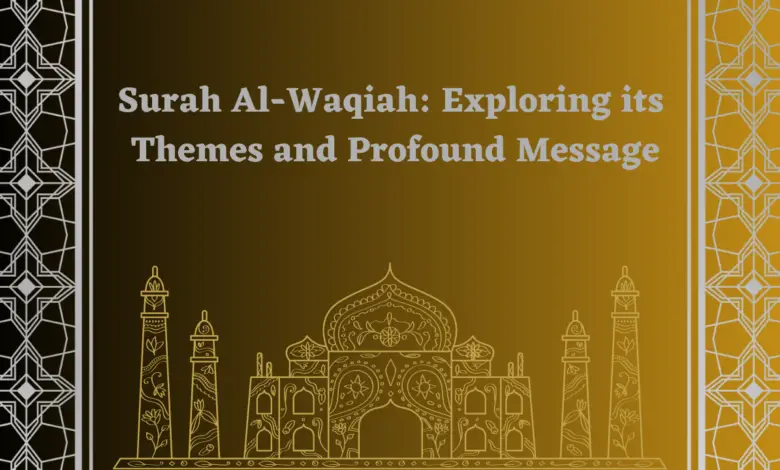Surah Al-Waqiah: Exploring its Themes and Profound Message
Themes and Profound Message of Surah Waqiah

Introduction:
Surah Al-Waqiah is the fifty-sixth chapter of the Quran, consisting of 96 verses. It holds immense significance in the Islamic tradition and is revered for its profound themes and powerful message. This article aims to delve into the themes and main messages conveyed in Surah Al-Waqiah, shedding light on the spiritual and practical insights it offers to believers.
Emphasis on the Inevitability of Death and the Afterlife:
One of the primary themes of Surah Al-Waqiah is the acknowledgment of the certainty of death and the accountability of individuals in the hereafter. The Surah begins with a vivid description of the Day of Judgment, painting a scene of cosmic upheaval and immense awe. This serves as a reminder to believers about the transitory nature of this worldly life and the ultimate reality of the afterlife. It encourages individuals to reflect upon their actions and strive for righteousness to secure a favorable outcome in the hereafter.
Divine Providence and Sustenance:
Surah Al-Waqiah emphasizes the concept of divine providence and sustenance. It highlights that all blessings and provisions are under the control of Allah alone. The Surah describes various types of sustenance, such as the provision of water, crops, and fruits, all of which are bestowed upon mankind by Allah’s mercy and wisdom. This theme serves as a reminder for believers to be grateful for their blessings and to recognize the source of all provision, thereby fostering a sense of humility and gratitude.
Warning against Self-Deception and Materialism:
Another significant message conveyed in Surah Al-Waqiah is the warning against self-deception and the dangers of materialism. The Surah presents a contrast between the righteous and the worldly-minded individuals. It highlights that those who prioritize worldly gains and neglect their spiritual well-being will face severe consequences in the hereafter. This serves as a cautionary reminder to believers, encouraging them to focus on the eternal rewards and not be ensnared by the temporary allurements of this world.
The Equality of Humanity:
Surah Al-Waqiah promotes the concept of the equality of humanity before Allah. It emphasizes that all individuals, regardless of their social status, wealth, or lineage, will be equal before Allah on the Day of Judgment. This theme is highlighted through descriptions of various groups of people, including the foremost, the righteous, and the misguided. It encourages believers to prioritize their relationship with Allah and their righteous actions, rather than worldly distinctions, fostering a sense of unity and humility within the community.
Encouragement to Seek Knowledge:
Surah Al-Waqiah underscores the importance of seeking knowledge and understanding the signs of Allah’s creation. It praises those who ponder upon the wonders of the natural world and recognize the intricate design and purpose behind it. The Surah urges individuals to reflect upon the creation of Allah, both in the heavens and on the earth, as a means to strengthen their faith and deepen their understanding of the divine wisdom.
Conclusion:
Surah Al-Waqiah encompasses a wide range of profound themes and messages, providing valuable guidance and reminders to believers. It emphasizes the inevitability of death and the afterlife, the concept of divine providence, the dangers of materialism, the equality of humanity, and the importance of seeking knowledge. By contemplating the lessons embedded in this Surah, Muslims can gain spiritual insight, develop a stronger connection with Allah, and strive for righteousness in both their personal and communal lives. Ultimately, Surah Al-Waqiah serves as a timeless source of inspiration, offering guidance for believers in navigating the challenges of the present world while preparing for the eternal life to come.





